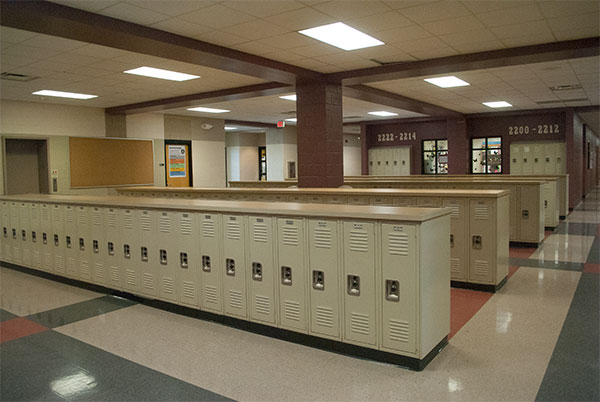
Empty locker bays prove the suspension of Smart Lunch does eliminate the need for crowd control.
Can Wakefield survive without SMART Lunch
Admin, teachers and students share reactions to the suspension of SMART Lunch
November 9, 2016
One quiet afternoon, the phone rings with the Wakefield Weekly update. A Wakefield student answers. The student’s jaw dropped open, “He didn’t.” The student becomes increasingly shocked. “He couldn’t have,” but he did. On Sunday, October 23, Principal Malik Bazzell announced that SMART Lunch had been put on a three week hiatus.
Because of recent unruly behavior during SMART Lunch, Principal Bazzell, along with other Wakefield leaders, decided that SMART Lunch would be suspended for three weeks. Contrary to popular belief, said behavior doesn’t have as much to do with Wakefield fights nor rude students as one would think.
“There’s this misconception that there’s a small percentage of kids out of everybody that are the problem, but that’s not the case,” Bazzell said. “The truth is that the majority of kids who remain on campus do not go to Smart Lunch consistently, so they’re all out and about; when any little thing happens, it makes that situation much more difficult to resolve. Adding crowd control on top of the situation just makes it that much more difficult [to handle].”
The decision remains unpopular among students. Students have gone over the intercom to mock Bazzell, social media is filled with offensive opinions and memes on the matter, and in a forum held during Pride Time on October 25, students actively booed at Bazzell.
“Smart Lunch is a sacred cow at Wakefield High School,” Principal Bazzell said. “It wasn’t something I wanted to touch with a 10 foot pole. Regardless of everybody involved in the decision making process, I, being the principal figurehead, am going to take the heat.”
Students have exercised their right to complain, especially during the forum that was held on October 25. However, some students feel that the proper points were not communicated during that forum. Many students rely on SMART Lunch, as it is instrumental in completing their activities, such as completing club hours, going to club meetings, making up tests, and getting extra help.
Jiselle Vellaringattu, a senior at Wakefield, has attended Wakefield for all four years of her high school career.
“SMART Lunch has provided me with the opportunity to attend club meetings, and do some of my club hours. For example, I’m in Spanish Honor Society, and the primary way we complete hours is through teacher help and tutoring. The main time we have set aside to complete these things is SMART Lunch,” Vellaringattu said.
Ms. Melissa Bell, a math teacher at Wakefield High School, is having trouble finding time to meet with her students.
“I can’t meet with students who have to retest, and I can’t meet with students to help them. I know we have Pride Time, but during SMART Lunch, I always had someone in [my room],” Bell said.
Bell is the advisor of Mu Alpha Theta, the math honor society at Wakefield.
“Without SMART Lunch, [Mu Alpha Theta] can’t do their required tutorials. Even with Pride Time, some of the members’ teachers may need [those students] in their classroom at that time,” Bell said.
Mr. Lipscomb, an English teacher at Wakefield, worries about his students’ ability to make up work since the suspension of SMART Lunch.
Some teachers, like Lipscomb, have decided to offer time before and after school to students who need extra help or who need to make up tests or quizzes. Some teachers have even started to offer Pride Time for all their students every day because of the SMART Lunch suspension.
Lipscomb says that even with Pride Time and offering extra time to students before and after school, it’s still not quite enough.
“I do enjoy that I can tell a kid, come and see me at SMART Lunch, knowing I have around an hour to work with that child,” Lipscomb said.
While the return of SMART Lunch is not guaranteed, it’s not hopeless. Peaceful protests among the students show the Wakefield staff that students are angered by this change, but show that they can handle such change in a civilized, respectful manner. Methods such as a petition, prove Wakefield’s student body’s commitment to SMART Lunch.
Bazzell has noticed all the petitions, and has listened to individual students’ suggestions to improve SMART Lunch and fix existing problems with the system.
“I think if we could make SMART Lunch work, it would be phenomenal,” Bazzell said. “The most powerful thing about it is, [students] are making a choice to go. If it could work, I am more than willing to make it work, but at the same time we can’t force it. It needs to be intrinsic motivation.”
